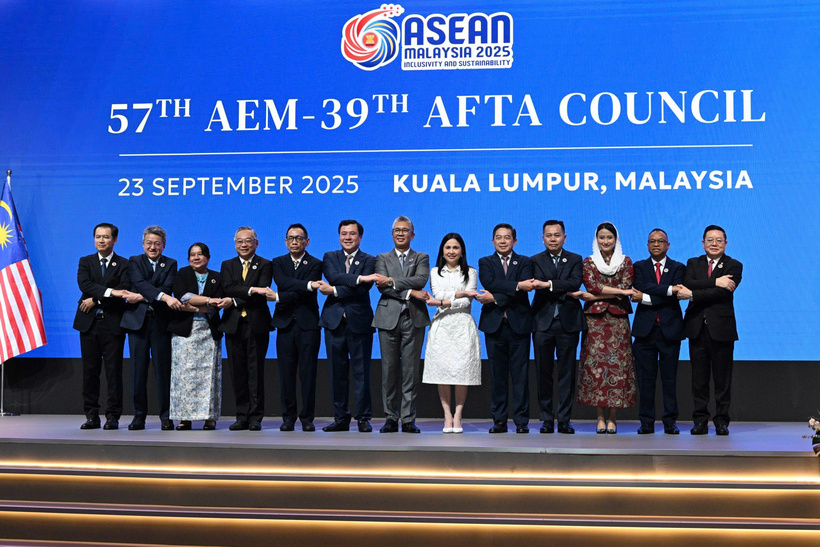Deputy Minister Nguyen Sinh Nhat Tan attends AEM 57
ASEAN economic ministers convened in Kuala Lumpur on September 23 to review trade commitments and strengthen regional cooperation.
On the morning of September 23, 2025, the 39th ASEAN Free Trade Area Council Meeting (AFTAC 39) and the 57th ASEAN Economic Ministers’ Meeting (AEM 57) officially opened in Kuala Lumpur, Malaysia.
The meetings were chaired by Malaysia’s Minister of Investment, Trade and Industry, Tengku Zafrul, with the participation of ASEAN economic ministers and ASEAN Secretary-General Kao Kim Hourn.
The Vietnamese delegation was led by Deputy Minister of Industry and Trade Nguyen Sinh Nhat Tan, accompanied by representatives from the Multilateral Trade Policy Department, the Department of Foreign Market Development, the Office of the Inter-agency Steering Committee on International Economic Integration, and the Ministry of Foreign Affairs.

The delegates posed for a group photo at the event.
At the AFTAC 39, ministers reviewed the implementation of the ASEAN Trade in Goods Agreement (ATIGA), including the adoption of Vietnam’s tariff commitments under the ASEAN Harmonized Tariff Nomenclature (AHTN 2022), the development of the ASEAN Trade Facilitation Strategic Action Plan (ATF-SAP) for 2026–2030, the rollout of the ASEAN Solutions for Investments, Services and Trade (ASSIST), the ASEAN Customs Transit System (ACTS), the ASEAN Single Window, progress on harmonization of standards and mutual recognition arrangements within ASEAN, among others. The meeting recorded that the utilization rate of ATIGA preferences averaged 52.72% between 2021 and 2024, reaching 58.0% in 2023 and 51.06% in 2024.
The meeting also noted that negotiations on the ATIGA upgrade had been completed, with domestic procedures expected to be finalized for the signing of the amending protocol on the sidelines of the 47th ASEAN Summit in October 2025.
At the AEM 57, ministers discussed Malaysia’s priority economic cooperation initiatives during its ASEAN Chairmanship year, major tasks of the ASEAN Economic Community (AEC) such as negotiations on the ASEAN Digital Economy Framework Agreement, sustainability initiatives within the AEC, implementation of the AEC Blueprint 2025, and the drafting of the ASEAN Community Vision 2045 and related strategic documents. Preparations for consultations between ASEAN economic ministers and dialogue partners were also reviewed.
The ministers acknowledged ASEAN’s continued resilience, with growth outpacing the global average at 4.8% in 2024. However, preliminary growth for 2025 was revised downward to 4.2% from the earlier 4.7% projection due to global geo-economic conditions. ASEAN trade expanded by USD 3.8 trillion in 2024, supported by sustained demand from key partners and robust intra-ASEAN trade, which accounted for 21.4%, the largest share of the bloc’s total trade.
Foreign direct investment (FDI) inflows into ASEAN reached USD 226 billion, up 8.5% year-on-year, with intra-ASEAN investment making up 13.9%, the second-largest component after investment from the United States (18.6%).
The meeting adopted a number of key documents to advance intra-bloc economic cooperation, especially in emerging sectors with high potential such as policy recommendations and implementation guidelines for an ASEAN electric vehicle roadmap, a study mapping ASEAN’s semiconductor supply chain and an ASEAN Semiconductor Supply Chain Integration Framework, and a capacity-building and talent development framework for inclusive businesses in ASEAN.
Ministers also reviewed recommendations from the ASEAN Geoeconomic Task Force and the High-Level Task Force on ASEAN Economic Integration, progress on the AEC Strategic Plan 2026-2030, initiatives to improve monitoring and evaluation frameworks, and research by the Economic Research Institute for ASEAN and East Asia (ERIA) on strengthening ASEAN-Gulf Cooperation Council (GCC) relations. The accession process of Timor-Leste to ASEAN and preparations for the 47th ASEAN Summit and related meetings in early October 2025 were also discussed.
In addition, internal discussions covered ASEAN’s economic cooperation with dialogue partners including the United States, China, the European Union, Japan, South Korea, Australia, New Zealand, India, Russia, Canada, and the United Kingdom. Ministers reviewed the implementation of ASEAN’s free trade agreements with partner countries, including the review and upgrade of the ASEAN–India Trade in Goods Agreement (AITIGA), negotiations on the ASEAN–Canada FTA, and the potential establishment of a CPTPP–ASEAN Trade and Investment Dialogue mechanism.
The ministers also held exchanges with the ASEAN Business Advisory Council (ABAC), noting its recommendations and priorities for strengthening regional trade and investment integration and advancing sustainable development cooperation.
During the discussions, Vietnam proposed that ASEAN members endorse its tariff commitments under ATIGA based on AHTN 2022, while also contributing constructively to issues of intra-ASEAN economic cooperation. These included supporting Malaysia’s priority initiatives, preparing for the signing of the ATIGA amending protocol, and shaping cooperation with the GCC. Vietnam’s proposals underscored its strong commitment to regional economic integration, active role in driving regional and global economic growth, and efforts to reinforce supply chain resilience.
The AFTAC 39 and AEM 57 concluded on September 23, 2025. They will be followed by a series of ASEAN economic ministerial consultations with dialogue partners, scheduled from September 24 to 26, 2025.



